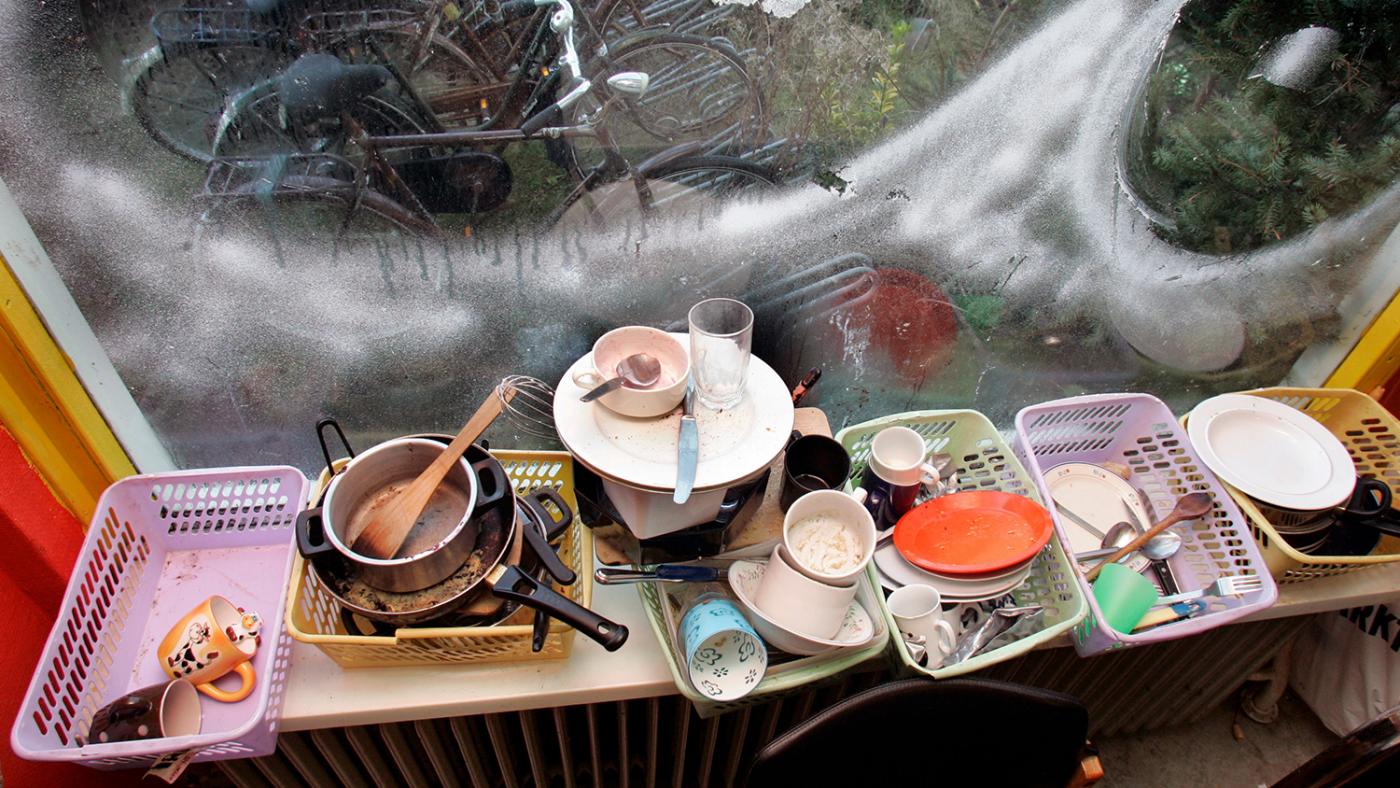'Hospiteren’, a stressful situation
‘It’s hard to keep motivated on your third introduction evening and counting'

A significant number of students looking for a room in Utrecht will have to go through a process called hospiteren, in which a group of prospective roommates is invited by those already living in the house to come over and get acquainted with everyone. The most suitable candidate is chosen by means of a series of questions.
Since the city is going through an appalling housing shortage, hundreds of desperate students are now jostling for rooms that most resemble broom closets, located in the most remote parts of town. Only those who manage to hide all their stress behind the most casual smile get picked. How do they deal with this situation and what do they actually think of the concept of hospiteren? DUB discussed the subject with four students.
At eight in the evening, they trickle in. They perch on the sofas in our editor's living room, occasionally taking a handful of chips from the bowls on the coffee table. There’s a tense silence. "Jeez, I think my hospiteer trauma is starting to get to me," Jesse jokes.
Let’s skip the infamous introduction round then. You are all living in shared homes now. Was it hard to find a room?
“Cheyenne (21), David (19), Jesse (24) and Ollie (24) nod vigorously, but soon they all look at Jesse, the only international student in the group. They all know that being a foreigner represents an additional obstacle when looking for a room. The majority of student homes are only interested in housemates who speak Dutch, which made things even harder for Jesse. Luckily, he can laugh about it now.”
How often did you have to go through hospiteer sessions before you found a room?
Jesse sighs: “I think I’ve sent out about two hundred emails. I only received a total of six responses. And I was turned down at all six evenings.” Eventually, he managed to move in with a classmate. He now lives in Lombok with other international students.
“In Lombok!”, Cheyenne sighs. She would have loved to live closer to the city centre but had to settle for a room in Zeist instead. “I was way too stressed out to stay picky.”
Did the stress surrounding hospiteer evenings get worse with time?
Cheyenne: “Yeah. In the beginning, I wasn’t stressed out at all. I would sit on my parents' sofa and scroll through the rooms announced on Facebook like I was able to pick out my own dream student life. Am I going to live in the house where they make pizzas together every Friday or the one where they have self-concocted cocktails on the balcony all summer long?”
Ollie, who lives in a “cosy broom closet in Overvecht” can relate to this initial optimism. “At first, I only replied to the homes that met my minimum requirements: not further away than five minutes cycling from the city centre, a garden or at least a balcony. When people didn't reply, I got more flexible: a room in Overvecht or Kanaleneiland would also do.”
After dozens of unanswered e-mails and a handful of failed introduction nights, Cheyenne says she was hit by despair. “I turned on the sound of my Facebook notifications. It became sort of an addiction: I was checking my phone all day long. At some point, I started reacting to everything as fast as I could.”
She did score a room, eventually. "On the eleventh hospiteer evening, I thought: ‘if I fail today, that's it, I'm moving back with my parents. Then they chose me.” She has no idea why she was picked that night and not the other times but she guesses she must have been a bit more outspoken compared to previous sessions.
What exactly makes hospiteren so stressful?
Ollie: “For me, it’s the fear of not finding a room in time. Cheyenne had the option of moving back with her parents but there are plenty of students who cannot count on such a last resort.”
Cheyenne: “Look, I actually think that everything about hospiteren is stupid: the endless scrolling, writing so-called personal emails... But the introduction nights are the worst. They made me really insecure. I could handle the first three rejections but, after that, I started to take it personally.”
David: “Yes, at some point you notice that they tend to pick the same type of people: socially-skilled, extroverted. Easy to get along with.”
What do you hate the most about these introduction nights?
David, who now lives in an SSH room at Catharijnesingel, answers without hesitation: “They’re just so fake.”
A discussion breaks out: in theory, the purpose of hospiteren is to discover whether there’s a mutual click between each candidate and the existing roommates but, according to the students, that’s not what it’s about in practice. According to them, the most important thing is being able to make a good first impression, which requires an ability to "read" the housemates.
Jesse: "In every single house I was invited to, I wondered: 'is this the kind of company in which I should go and tell, as unsarcastically as possible, that I like cleaning and Lowlands, or do I put on all my vintage clothes on top of each other and start bragging about my Cineville card?"
David: “And if you're not already selling your own shit, you have to hear everyone else's. It’s hard to remain genuinely enthusiastic when you hear the same stories for the third night in a row."
Cheyenne: “That's why the more insecure I became, the less enthusiastic I got."
That's the essence of the problem, in the students' view: in addition to the fear of not finding a room, there is a lot of insecurity and social pressure involved. Those feelings grow with every rejection. The more under pressure you feel, the less you’re able to be yourself, which is counterproductive. People can sense that immediately, which reduces your chances of being picked. Jesse: “And thus you end up in a vicious circle of endless hospiteer evenings.”
There are plenty of articles online with tips on how to act during a hospiteer evening (in Dutch only, Ed). Do you believe one can learn to hospiteren?
Ollie: “I do think you can get better at it, yes. Observing what other people say during those evenings, learning what does and doesn’t work, finding a way to stay yourself...”
Cheyenne: “Perhaps the more social activities you engage in and the more comfortable you are in your own skin and student life, the better it goes. In that sense, life experience might be a sort of practice?”
David: “But naturally spontaneous people are always going to be more likely to be chosen. Whoever succeeds best in pretending to be the ideal roommate wins."
Jesse: “Yes. If I were to summarize my tips, it would be: be yourself but not too crazy. Don’t revert to cliches like 'my hobbies are cooking and cleaning' but also don’t talk about your seven mini turtles or that you sometimes laugh so hard that you pee your pants.”
David: “Like I said: fake.”

You sound pretty negative about the whole hospiteren process. Do you think that hospiteren is a suitable way to find a room or should there be an alternative?
David: “Well, you do have to check if you click with people. I don’t really see another solution.”
Jesse: “The real problem isn’t hospiteren itself, it’s the shortage of rooms.”
Jesse isn’t the only one with that opinion. In a survey by the student union Vidius, respondents indicated that hospiteren would be a lot less of a problem if the number of students and the number of available rooms were more in sync.
Even so, Ollie thinks there is room for improvement. “I’ve had nights where the applicants were invited one by one instead of ten people at the same time. It felt much more natural. That's how I found my current room.”
Yet, the solution does not lie solely on students themselves. Cheyenne stresses that "the real solution would be more housing."
DUB contacted student housing provider SSH to talk about the issue. Did they ever get any complaints from students who can't take yet another rejection? Lisa Plender, press officer for SSH: "Yes, there are students asking for a direct placement instead of having to go through introduction evenings. We understand that students get stressed out in the process. If they do not manage to find a room after twenty of those evenings, they can get a room directly through us. This rarely happens in practice but, this way, students are guaranteed to get a room through SSH."